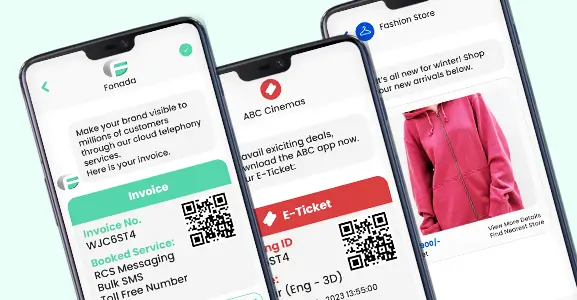A Virtual Call Center (VCC), or Virtual Contact Center, is a flexible and modern version of a regular customer service center. Instead of being in a fixed location, it works in the cloud. This means businesses utilizing virtual call centers can assist their customers from anywhere in the world.
With this Contact Center technology, businesses can use advanced tools to strengthen their customer relationship bond, such as via virtual phone numbers or other cloud telephony solutions.
This setup offers flexibility for both the agents and the company, as it allows employees to work from different geographical locations. Virtual call centers leverage cloud telephony technology to connect agents with customers seamlessly using dedicated software and communication tools.
This virtual model is highly cost-effective for businesses, as it eliminates the need for a dedicated office space and can tap into a wider pool of potential employees.
In this blog, we will break down what a Virtual Call Center is all about. We will also discuss its benefits, features, working, and use cases. Businesses thinking of investing in this technology can consider this blog to gain comprehensive insights into everything about this technology.
What Is A Virtual Call Center?
A virtual call center (VCC) is a modern cloud-based remote setup of contact center where agents use internet or cloud-based tools to interact customer inquiries and issues. The virtual contact center operates remotely, with agents distributed across locations. This decentralized structure allows agents to work from home or other remote locations.
With the virtual contact center technology, businesses can use advanced tools to strengthen their customer relationship bond, such as via virtual phone numbers or other cloud telephony solutions.
Compared to traditional call centers that often require a dedicated physical space, remote call centers offer flexibility in staffing and operations. They enable companies to fetch a global talent pool, potentially leading to more diverse and specialized business communication skills among their agents.
Moreover, virtual call centers often utilize cloud-based systems and advanced communication tools, enabling seamless interactions between agents and customers regardless of geographical boundaries.
This can result in enhanced scalability, cost-efficiency, and improved customer service experiences.
How Does A Virtual Call Center Work?
Virtual call centers mirror regular call centers in terms of their functionalities and operations. The key distinction lies in their accessibility.
Unlike traditional setups, virtual contact centers offer ease of use as they don’t require an extensive arrangement of resources.
They can be established in smaller spaces across various locations, including people’s homes. This cloud call center setup is cost-effective as it does not demand high-end technology to operate efficiently.
They primarily utilize VoIP technology for their operations, and processed data is stored in the cloud.
This virtual call center software facilitates communication among call center personnel, enabling them to interact and utilize video applications such as Zoom or Microsoft Teams.
These call centers manage both inbound and outbound calls. Inbound calls originate from customers seeking assistance, whether it’s regarding a product query or troubleshooting an issue.
On the other hand, outbound calls are initiated by agents to aid customers or prospect new ones by reaching out to individuals who might be interested in the business’s offerings.
Types Of Virtual Call Centers
Virtual contact centers encompass various setups to handle different types of calls. They are designed to offer virtual customer service and help businesses strengthen their customer relationships.
All the major types of virtual contact centers are mentioned below:
1. Virtual Inbound Call Centers
Virtual inbound call centers focus on receiving incoming calls from customers. They work on the advanced virtual call center softwares. They often handle inquiries, support requests, orders, and other customer service-related matters.
2. Virtual Outbound Call Centers
Virtual outbound call centers primarily make outgoing calls, such as telemarketing, sales calls, follow-ups, call scheduling, surveys, and appointment reminders.
3. Blended Call Centers
Blended call centers integrate both inbound and outbound functionalities. Agents in blended call centers handle both incoming and outgoing calls based on the demands of the business.
They can switch between answering customer inquiries and making outbound calls for sales or surveys.
Each type of call center operates on a particular virtual call center software, training, and operational strategies to handle calls and achieve business objectives effectively.
This approach supports a work-from-home setup, enabling agents to assist customers with their queries 24/7, regardless of their location or time zone.
Why Should Businesses Setup A Virtual Contact Center?
A virtual call center is a cloud-based customer service setup where teams of virtual agents, usually working remotely, handle customer inquiries, support requests, and service-related interactions from dispersed locations.
This setup replaces the traditional centralized office space (PBX phone system) with a network of agents who communicate with customers through social media channels like phone calls, emails, chats, or social media platforms.
Benefits Of Virtual Call Centers
Businesses opt for virtual call center solutions due to these compelling reasons:
1. Cost Efficiency And Savings
Transitioning to a virtual contact center solution for businesses can significantly reduce expenses associated with maintaining a physical office, such as leasing costs, utilities, and infrastructure. Small businesses may cut operational costs by 30% after shifting to a virtual call center model. Virtual call center for small businesses allows them to allocate resources to other critical areas of their business.
2. Flexibility And Global Access To Talent
Remote work flexibility attracts a diverse pool of talent from different geographic locations. With VCC, businesses can facilitate remote customer service and streamline their communication. Businesses may expand their customer support team by hiring multilingual virtual call center agents from various countries. It enables them to provide 24/7 customer support to a global customer base without geographical limitations.
3. Scalability And Adaptability
A virtual call center platform offers agility in scaling operations up or down based on business needs. A Company may seamlessly adjust its team size during peak seasons by onboarding temporary remote call center agents, ensuring uninterrupted customer service without physical space constraints. These scalable virtual call center solutions contribute to business growth by embracing adaptability.
4. Enhanced Disaster Recovery And Continuity:
Virtual call center services provide a robust backup system during unwanted events like natural disasters or crises. For instance, during the pandemic, companies smoothly transitioned their call center operations to work-from-home call center setups, ensuring uninterrupted service despite office closures.
5. Improved Customer Service And Personalization
Remote call centers use advanced technologies i.e. IVR, virtual number, call masking and analytical tools. This helps virtual call center representatives deliver more personalized customer experiences. With the help of analytical data, virtual call center agents can offer personalised solutions, services and products to their customers by considering their preferences and needs. Also, this data empowers them to address customers’ potential issues before they arise. This results in a higher customer satisfaction and stronger relationships
6. Advanced Analytics And Insights
Virtual call center platforms harness analytics tools to track key performance indicators (KPIs), monitor agent productivity, and gain valuable insights into customer preferences and behavior.
7. Global Reach With Virtual Call Centers
Access to a larger pool of potential employees, businesses can hire remote call center agents from different geographical locations. It allows them to connect with talents having multilingual capabilities. This also enables better communication with customers from various regions or demographics, broadening market outreach.
8. Lower Infrastructure Expenses
Virtual call center solutions eliminate the need for physical office space, reducing costs related to rent, utilities, maintenance, and office supplies. Additionally, there are savings on equipment costs since employees often use their own devices.
Virtual Call Centers Vs Traditional Call Centers
Here’s a comparison table highlighting key features between Virtual Call Centers and Traditional Call Centers:
| FEATURES | VIRTUAL CALL CENTERS | TRADITIONAL CALL CENTERS |
|---|---|---|
| Location | Geographically dispersed agents | Centralized office-based agents |
| Infrastructure | Cloud-based, minimal hardware | On-premises, extensive hardware |
| Flexibility | Highly flexible, scalable | Limited scalability and flexibility |
| Cost | Lower initial setup costs and cost-effective call center options | Higher initial setup costs |
| Operating Hours | 24/7 customer support | Limited by office hours |
| Agent Hiring | Access to a broader talent pool | Restricted by local availability |
| Training | Remote training possibilities for virtual call center operators | In-person training sessions |
| Employee Satisfaction | Potential for remote work boosts satisfaction | Traditional office setting impacts satisfaction differently |
| Technology Dependence | Relies heavily on internet stability | More reliant on internal infrastructure |
| Security | Centralized security management | In-house control over security measures |
| Disaster Recovery | Enhanced due AI-powered virtual call centers | Relying on local backup systems |
How To Start A Virtual Call Center In 9 Steps?
If you are running a startup and looking to start a virtual call center for your business operations then investing in a reliable cloud call center solution can unlock significant benefits for you. Follow the below 9 steps checklist below to learn how to launch a virtual contact center –
Research And Planning:
- Market Research: Understand the demand for call center services. Identify potential clients and industries that could benefit from your services.
- Business Plan: Outline your business model, target market, services offered, financial projections, and marketing strategies.
Legal And Administrative Setup:
- Business Registration: Register your business and obtain any necessary licenses or permits.
Technology Infrastructure:
- Select Call Center Software: Choose reliable and scalable software for managing calls, customer data, and analytics.
- High-Speed Internet and Hardware: Ensure your team has access to a stable internet connection and appropriate hardware (computers, headsets, etc.).
Recruitment And Training:
- Hire Agents: Recruit skilled and qualified call center agents. Consider their communication skills, technical abilities, and customer service expertise.
- Training Programs: Develop comprehensive training programs to familiarize agents with your services, products, and customer interaction protocols.
Operational Setup:
- Establish Work Processes: Define workflows, call scripts, and guidelines for handling different types of calls.
- Remote Work Policies: Create policies and protocols for remote work, including security measures and data protection.
Client Acquisition And Marketing:
- Marketing Strategy: Develop a marketing plan to attract clients. Network, advertise, and utilize online platforms to reach potential clients.
- Client Relationships: Build relationships with clients through exceptional service and value-added offerings.
Launch And Monitor:
- Soft Launch: Begin operations on a smaller scale to iron out any issues before a full launch.
- Monitor and Improve: Continuously evaluate performance metrics, gather feedback, and refine processes to improve service quality.
Compliance And Security:
- Compliance: Ensure compliance with data protection laws (such as GDPR, CCPA) and industry-specific regulations.
- Security Measures: Implement robust security measures to protect customer data and maintain confidentiality.
Scaling And Growth:
- Scalability: Plan for scalability as your business grows. Invest in technology and human resources accordingly.
- Feedback and Adaptation: Adapt to market demands and client feedback to expand services and grow your business.
Starting a virtual call center requires dedication, attention to detail, and a focus on delivering excellent customer service. Flexibility and adaptability are also key as you navigate the dynamic landscape of client needs and technological advancements.
How To Manage A Virtual Call Center (Best Practices)
The best practices for managing a VCCs are:
Ensure A Secure Work Environment
Uphold strict adherence to security protocols among workers, ensuring connectivity through private hotspots or VPNs for enhanced data protection. virtual call center security
Foster Collaborative Spaces
Cultivate an environment where employees feel a sense of teamwork, nurturing social connections among remote workers to enhance productivity & employee engagement in VCCs
Implement Structural Guidelines
Provide a clear framework for operations, offering a structured approach that aids those accustomed to in-person work, facilitating their adaptation to virtual settings.
Avoid Micromanagement
Refrain from excessive monitoring tactics such as keyloggers, recognizing that remote work requires trust and autonomy for optimal performance from employees.
Utilize Video Communication
Encourage interactions among team members and with customers through video calls, enabling a more personal connection in the virtual workspace.
Offer Diverse Training Solutions
Provide comprehensive training resources like video conferencing, screen-sharing tools, and instructional videos tailored to remote work preferences. Allow for in-person training if necessary, for certain employees.
Embrace Different Time Zones
Leverage the diversity of time zones among employees to ensure round-the-clock availability, offering seamless support to customers at any hour.
Offer Multilingual Virtual Call Center Services
By offering comprehensive multilingual virtual call center services, businesses can cater to diverse linguistic needs. These expert agents ensure seamless communication, delivering exceptional support across languages to enhance customer satisfaction and engagement for your business.
Virtual Call Center Case Studies
Here are a few case studies showcasing the implementation and success of virtual call centers:
Virtual Call Center Case Study 1
A Leading Ed-Tech Company’s Transition To A Virtual Call Center
A leading Ed-tech company was facing challenges with its traditional call center. They had limited capacity and high operational costs and struggled to handle peak call volumes efficiently. They decided to transition to a VCC model to address these issues.
Implementation: They partnered with Fonada for a cloud-based contact center solution to set up a virtual call center. Agents were recruited remotely, allowing for a broader talent pool. Our VCC software provided features like call routing, real-time analytics, and integration with CRM systems.
Results: The transition led to a 43% reduction in operational costs due to lower infrastructure expenses and optimized staffing. Customer satisfaction scores increased by 37% as the virtual model allowed for quicker response times and improved agent training through digital tools.
Virtual Contact Center Case Study 2
Scaling Support With Virtual Call Centers For An ECommerce Giant
An e-commerce giant experienced rapid growth, leading to a surge in customer inquiries. Their existing call center struggled to handle the volume, resulting in long wait times and dissatisfied customers.
Implementation: They adopted our virtual call center strategy by leveraging a scalable, customised, and cloud-based solution. They implemented chatbots for basic queries, freeing up human agents for more complex issues. Additionally, they allowed agents to work remotely, providing flexibility and reducing the need for a physical office.
Results: The use of chatbots reduced first-response times by 39%, improving overall customer satisfaction. Remote work options attracted skilled remote call center agents from diverse geographical locations, enabling them to operate 24/7 support efficiently. As a result, customer retention increased by 27%.
Remote Contact Center Case Study 3
Enhancing Efficiency And Agent Experience For A Renowned Fintech Startup
A renowned Fintech startup wanted to focus on creating a positive work environment for its agents while maintaining high-quality customer service.
Implementation: They invested in our virtual call center platform equipped with AI-driven analytics to monitor and improve agent performance. Agents were given access to comprehensive training modules and tools for real-time collaboration.
Results: Agent satisfaction increased by 35% due to flexible work hours, reduced commute stress, and better training opportunities. The AI analytics helped identify bottlenecks and optimize processes, resulting in 15% higher productivity. Customer feedback indicated a 20% improvement in service quality.
Conclusion
A virtual call center is a modern cloud-based setup. It’s like a regular call center, but everything happens online! Agents work remotely, using their computers and headsets to handle calls, chats, or emails.
This flexibility benefits both companies and employees, offering balanced work-life access to a wider talent pool. For businesses, VCCs mean reduced office space and equipment costs while still providing top-notch customer support. Overall, Virtual Contact Centers revolutionize how companies interact with customers, making service more accessible, efficient, and responsive in our digital age.
FAQs
A virtual contact center is a remote setup where agents handle customer interactions using software to manage calls, messages, and support across various channels.
A virtual contact center agent is a remote worker who handles customer inquiries, support, or sales using technology to engage and assist customers without a physical office presence.
To set up a remote call center, follow the below steps:
- Choose reliable VoIP service providers
- Set up the necessary hardware
- Select a cloud-based call center software
- Hire agents & train them remotely
- Establish protocols for seamless operations.
Yes, virtual contact centers are legitimate. They operate remotely, handling customer service, sales, and support like traditional call centers, leveraging technology for efficiency and flexibility.
A virtual call center operates remotely, with agents working from different locations, using technology to handle incoming and outgoing calls, and providing customer support or services.

Dec 11, 2024
Top Contact Center Optimization Tools For 2024
“A thriving business knows how to fetch maximum output from limited resources by optimizing ca... Read More
Nov 13, 2024
What Is Brand Communication? CPaaS Role Explained
Did you ever wonder why some advertisements grab your attention instantly, while others do not? The... Read More
Nov 01, 2024
What Is Automated Messaging And How Does It Work?
Automated messaging or text automation empowers businesses and marketing professionals to connect wi... Read MoreLatest Updates
From Fonada
Industry Insights, Trends, Innovations, Updates, and Case Studies from Industry Experts
View
Customer
Reviews
Discover why our customers love us - read their authentic and heartfelt reviews!
View
Case
Studies
Explore real-life scenarios, offering analysis, and solutions to practical challenges
View
Convert Leads Into Sales With Fonada
Trusted CPaaS Solution Provider








